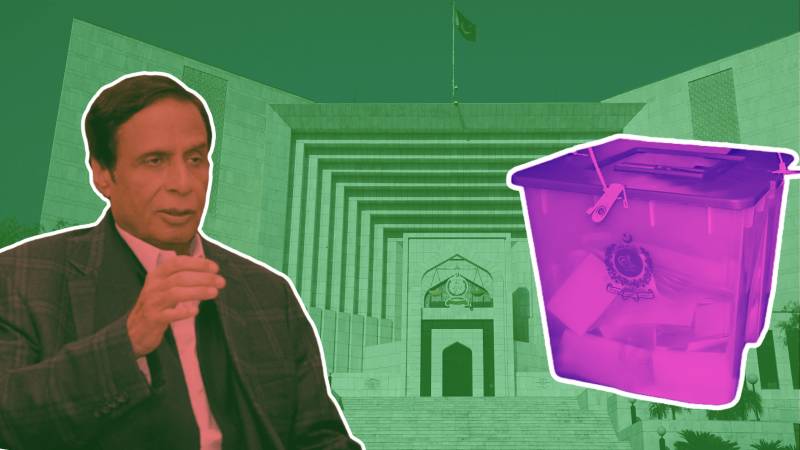
Observing that democracy is all about participation and representation of the public will, the top court on Friday allowed detained Pakistan Tehreek-e-Insaf (PTI) President Parvez Elahi to contest the upcoming general elections from PP-32 of Gujrat.
“At the heart of a thriving democracy lies the fundamental process of elections, an embodiment of the democratic principle that power should be vested in the hands of the people,” observed Justice Mansoor Ali Shah in a five-page written order on Elahi’s petition.
Earlier, a three-judge bench headed by Justice Mansoor Ali Shah and comprising Justice Jamal Khan Mandokhail and Justice Athar Mianallah, took up Elahi’s petition for hearing.
Elahi had filed an appeal in the Supreme Court challenging a decision of the Lahore High Court (LHC) wherein the latter had upheld a decision of the election tribunal to reject his nomination papers.
In its order, the top court further directed the Election Commission of Pakistan (ECP) to ensure that all the necessary actions in the electoral process are taken so that the petitioner can contest elections on the scheduled date without fail.
“Elections offer a structured and equitable way for citizens to participate in the democratic process and express their preferences for leaders and policies,” Justice Shah observed, adding that the legitimacy of a democratic government hinges on its reflection of the people's will, which is only possible through widespread and inclusive participation of candidates and voters in the election process.
“Pro-enfranchisement policies ensure that every eligible citizen, irrespective of his or her background, has the opportunity to vote, thus reinforcing the democratic tenet of equal representation.”
The court noted that the threat of disenfranchisement posed by improperly rejecting nomination papers looms large in a democracy and may undermine the fairness and integrity of the electoral process.
The order further observed that a democratic society committed to fairness must actively combat disenfranchisement, ensuring that all voices are heard and valued in the political arena.
“Inclusive electoral processes contribute to political stability and social cohesion. This stability is essential for the long-term prosperity and peace of any society. The vitality of elections in a democracy cannot, therefore, be overstated.”
Earlier, at the very outset, the court noted that the right to contest elections was a fundamental right guaranteed by Article 17(2) of the Constitution. It further said that the conditions for the qualification and disqualification of a candidate to enter the electoral contest had been laid down in Articles 62 and 63 of the Constitution, read with Section 232 of the Act.
“The right to contest election being a fundamental right, the provisions in the Act including Section 60 thereof that curtail or in any manner affect this right are to be construed strictly and applied restrictively. Since the matter relates to Section 60(2)(b)&(d) of the Act.”
The top court observed that the respondent's stance that the candidate must open a separate bank account for every seat they are contesting was not the intent and purpose of the law. Thus, the objection is not legally sustainable.
“Perusal of the Form B submitted by the petitioner clearly shows that the listed assets are as on June 30, 2023. Even otherwise, the petitioner has categorically denied that he has purchased the said property, and no summary inquiry has been conducted by the RO to ascertain the factual position under section 62(9) of the Act,” the court held on the accusation that Elahi had failed to declare ownership of a plot in Lahore which had allegedly been bought in November 2023 when he was detained in jail.
“The rejection order of the RO was therefore not legally sustainable on this ground. Probably for this reason, the appellate tribunal, while hearing the appeal against the rejection of the nomination paper by the RO, has discarded the said objection and maintained the RO’s order only on the ground of not holding an exclusive bank account for every seat.”
The court observed that the high court, where Elahi unsuccessfully challenged the election tribunal's decision, had re-introduced the objection to uphold the returning officer's order to reject Elahi's nomination papers.
"The Lahore High Court exceeded its jurisdiction,” the top court observed.
During the hearing, Justice Athar Minallah observed that it seemed as if the caretaker government was involved in getting Elahi’s nomination papers rejected. During arguments, it emerged that the petitioner had denied the purported property ownership document presented in court, while its alleged existence was communicated to a voter by a government revenue official.
Justice Minallah further remarked that returning officers are supposed to facilitate election candidates instead of burdening them, adding that, unfortunately, all this is happening with only one political party.
Cases of other PTI leaders
Meanwhile, in separate cases, the top court also allowed PTI leaders Umar Aslam, Major (retired) Tahir Sadiq, TikToker and PTI supporter Sanam Javed, and Shaukat Basra to contest the upcoming general elections.
Major Sadiq had submitted his nomination papers from NA-49 (Attock), but the RO had rejected them. The matter eventually landed in the Supreme Court after the Lahore High Court (LHC) upheld the election tribunal's decision.
Similarly, PTI candidate Umar Aslam from NA-87 (Khushab) had also approached the top court.
A three-judge bench, headed by Justice Shah and comprising the same judges as Elahi's case, heard the cases. During the hearing, Justice Shah remarked that no law prevented a fugitive from exercising his right to participate in elections.
Justice Minallah said the ECP was answerable to the public and should let them decide who is what.
Another bench of the top court, headed by Justice Munib Akhtar, allowed Shaukat Basra - a candidate from NA-160, and Sanam Javed - a candidate from NA-119 and PP-150, to participate in the polls.
During the hearing, Justice Akhtar questioned the rationale for excluding a candidate from the electoral race merely for a 30-minute delay in submitting nomination papers beyond the scheduled time.
He further remarked that there was no prohibition on using a joint bank account for a contestant.

